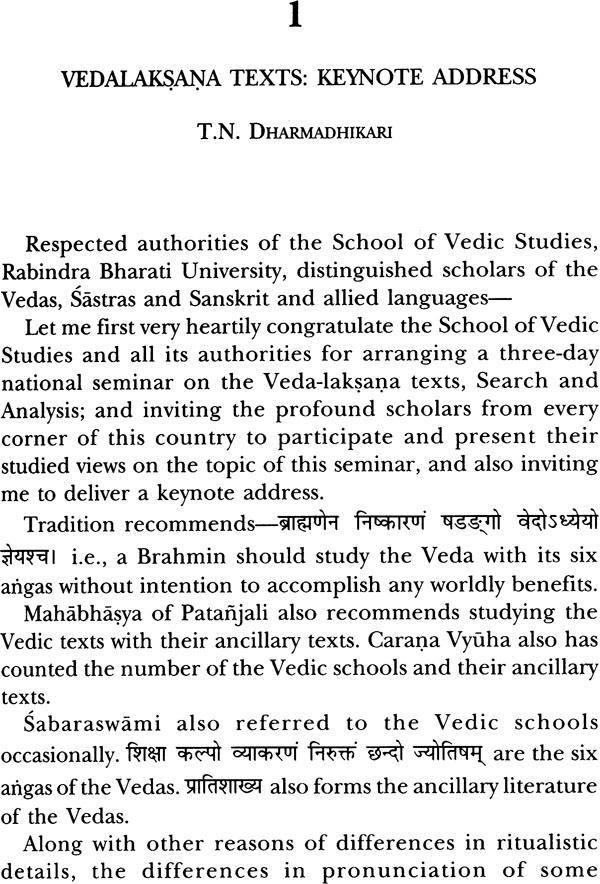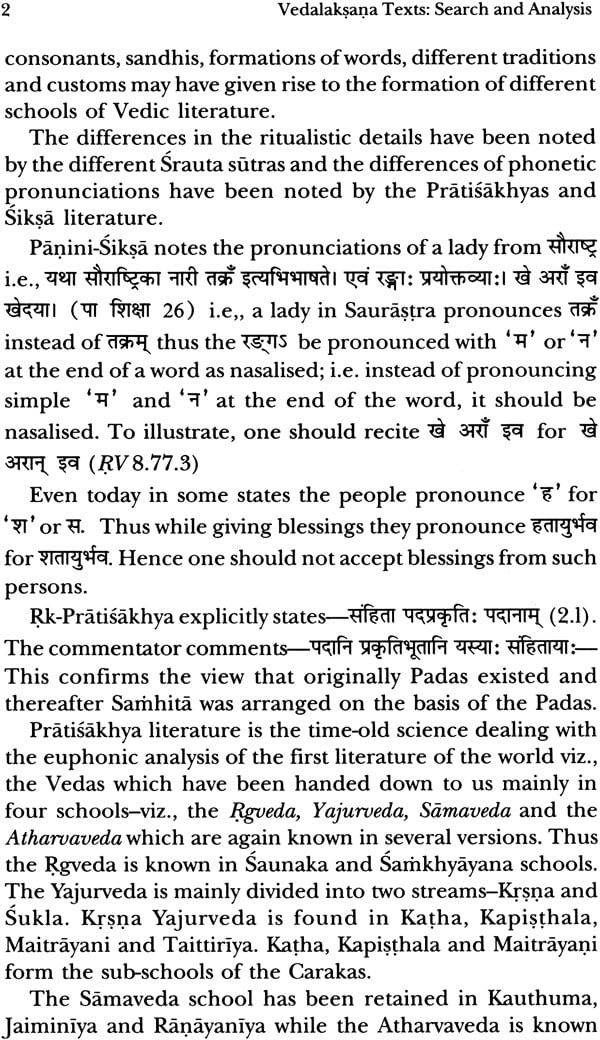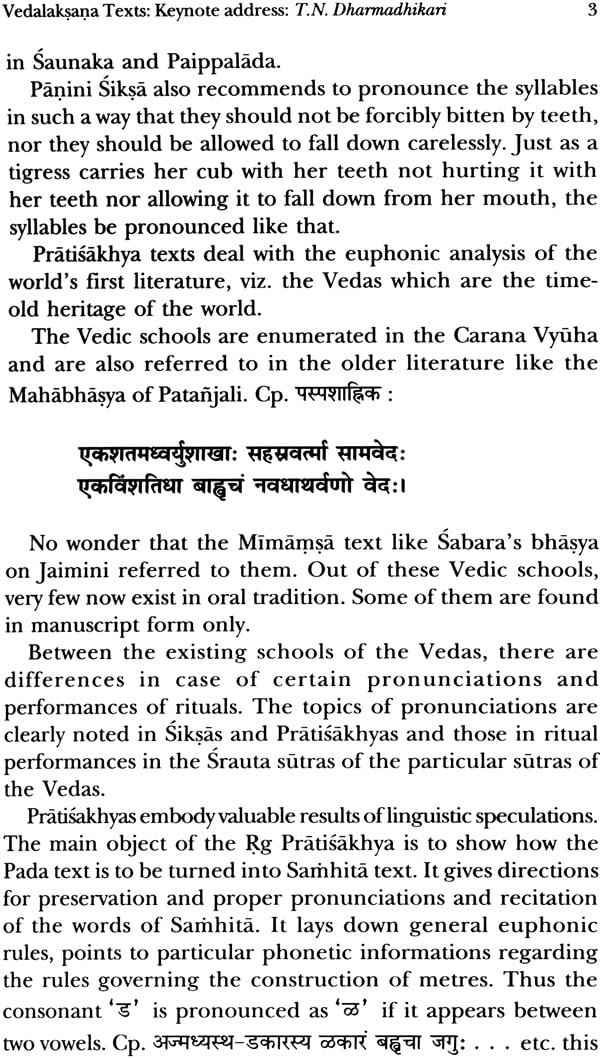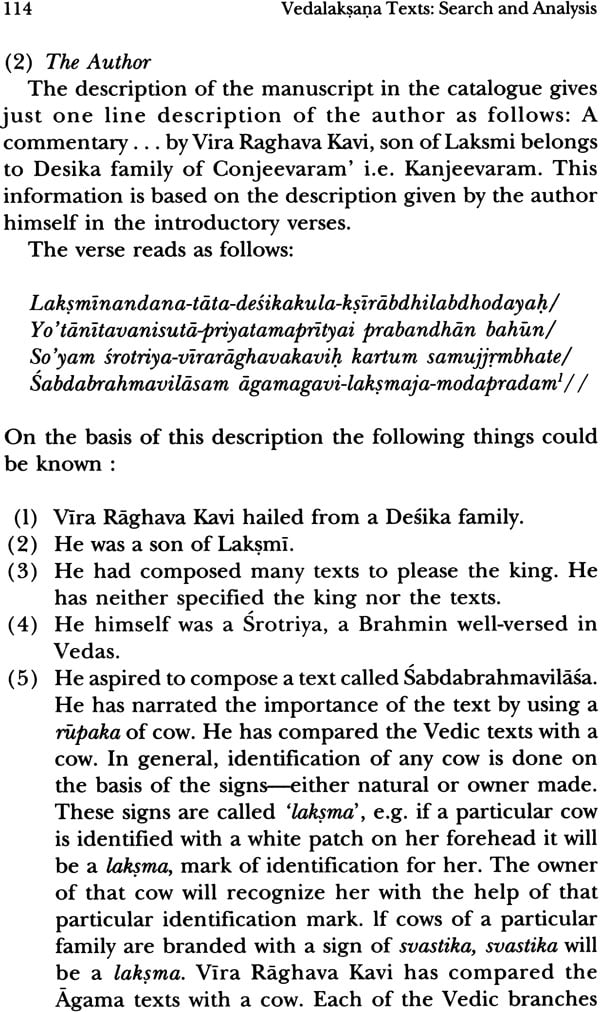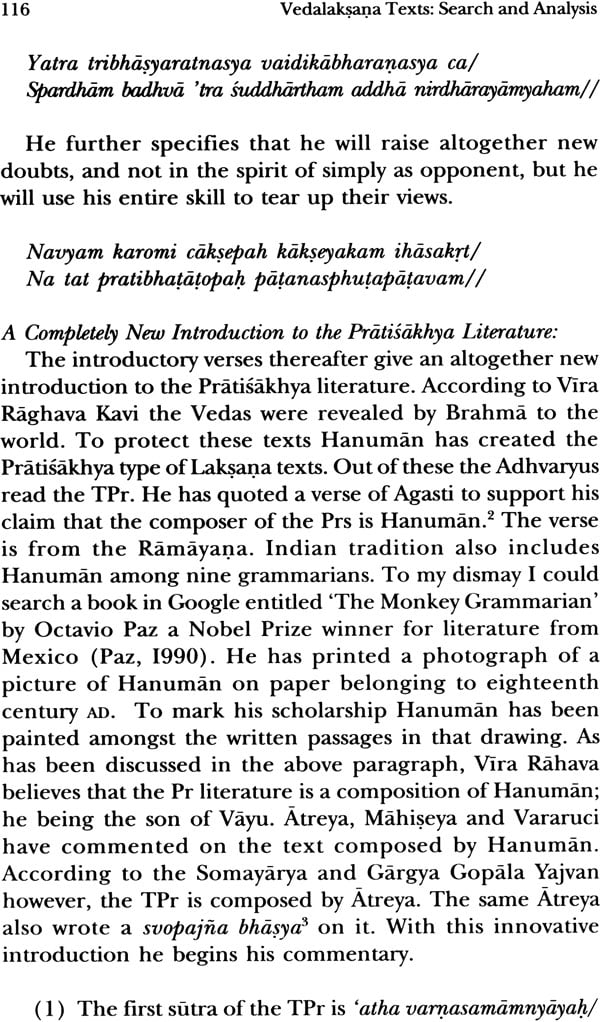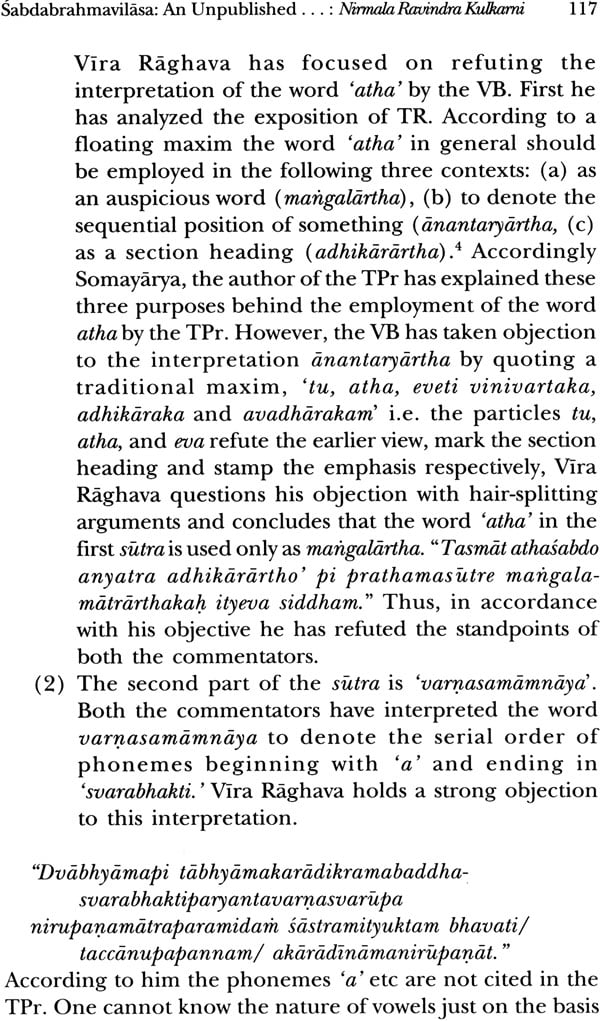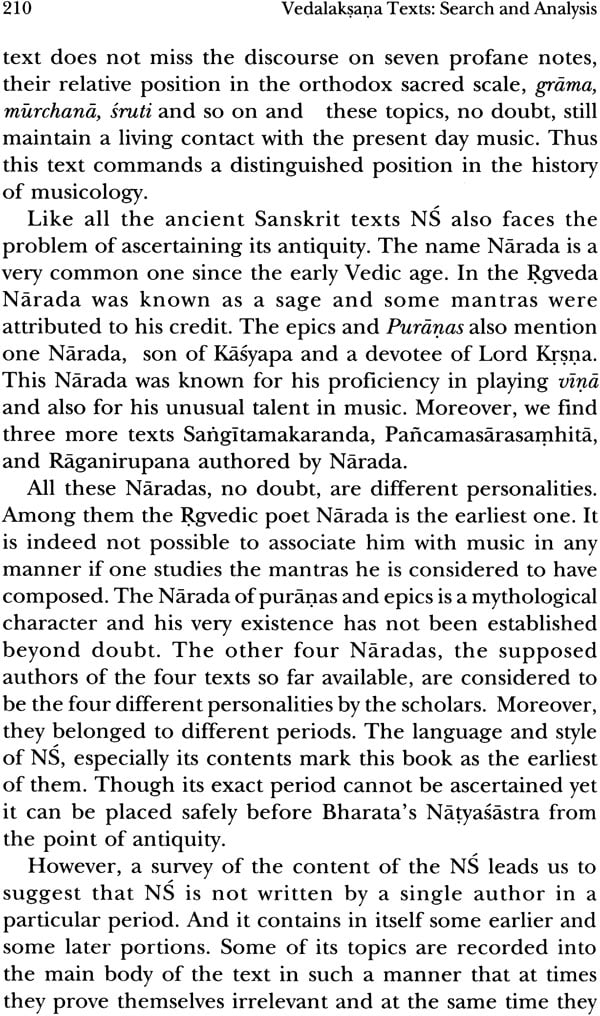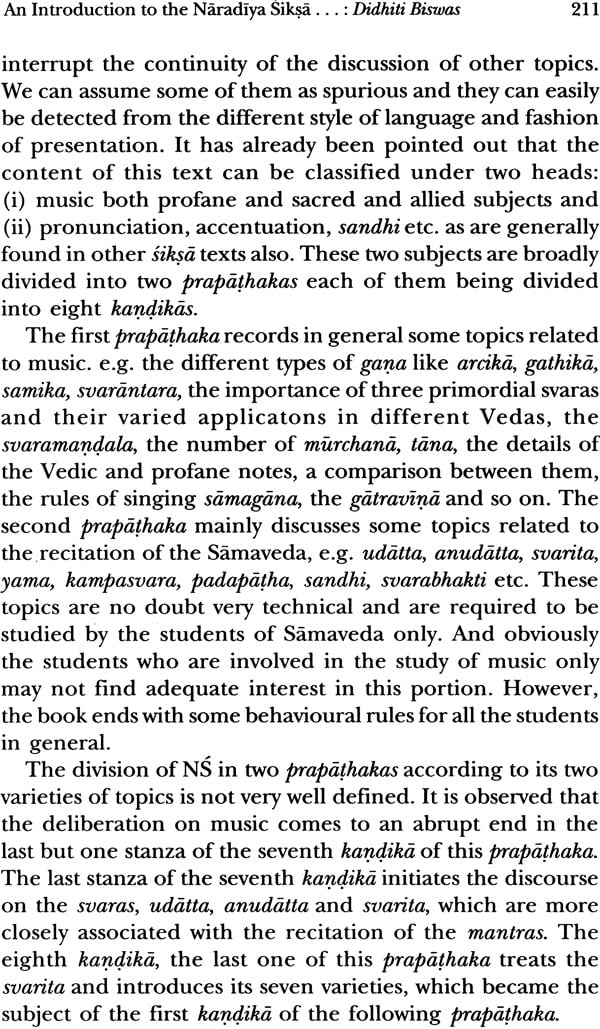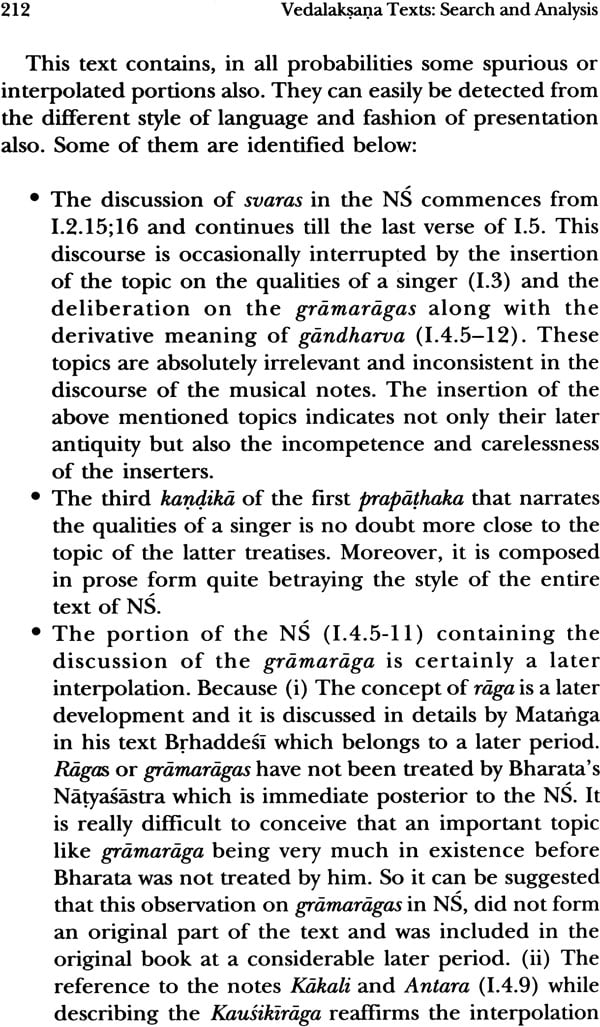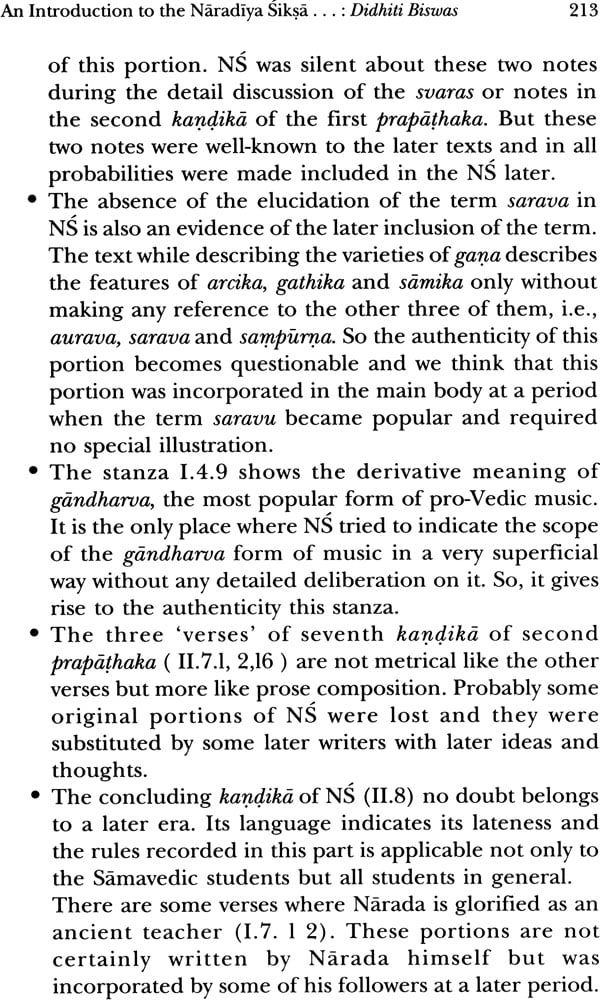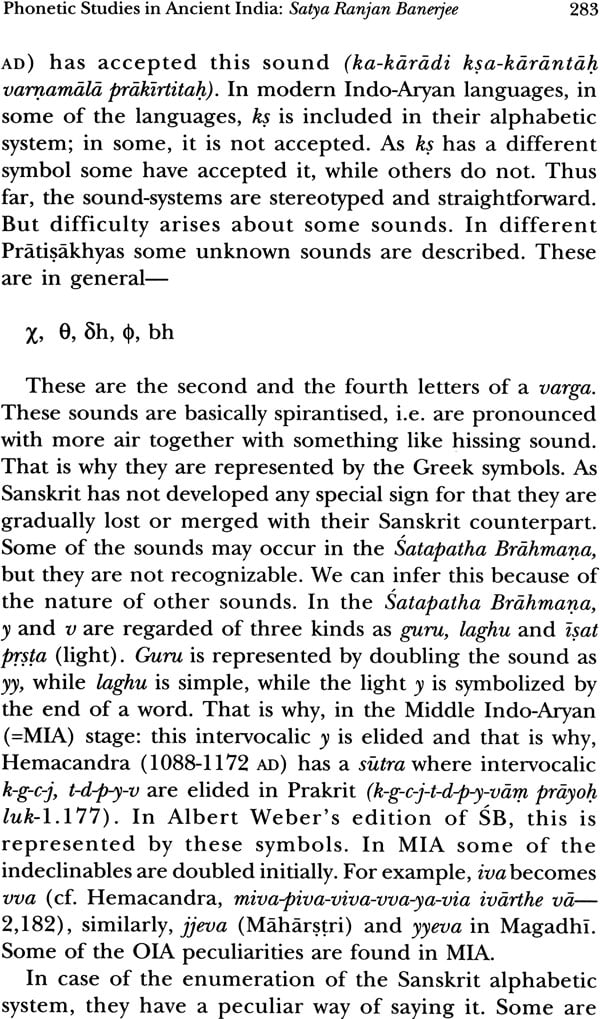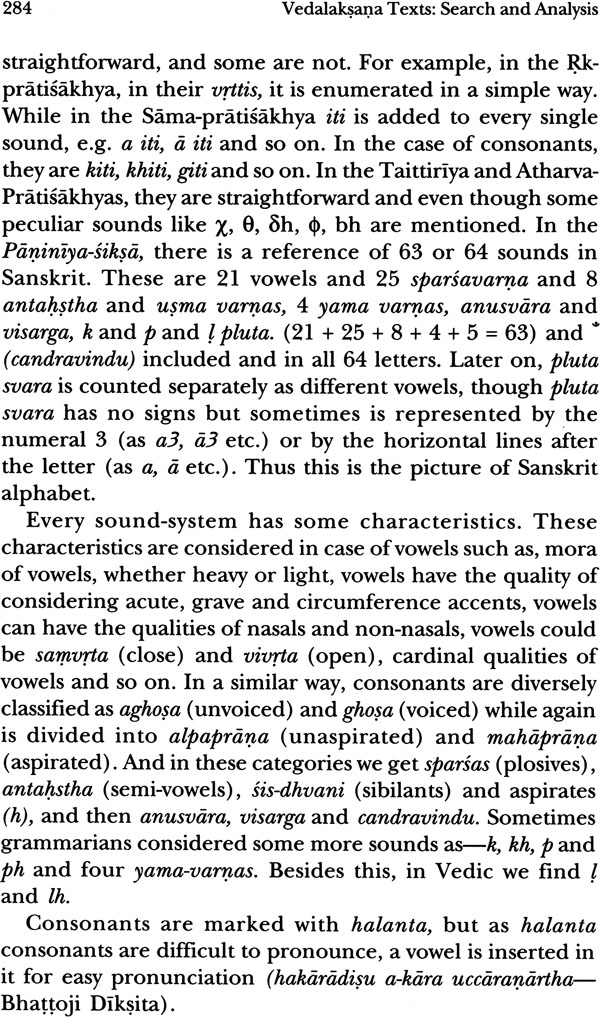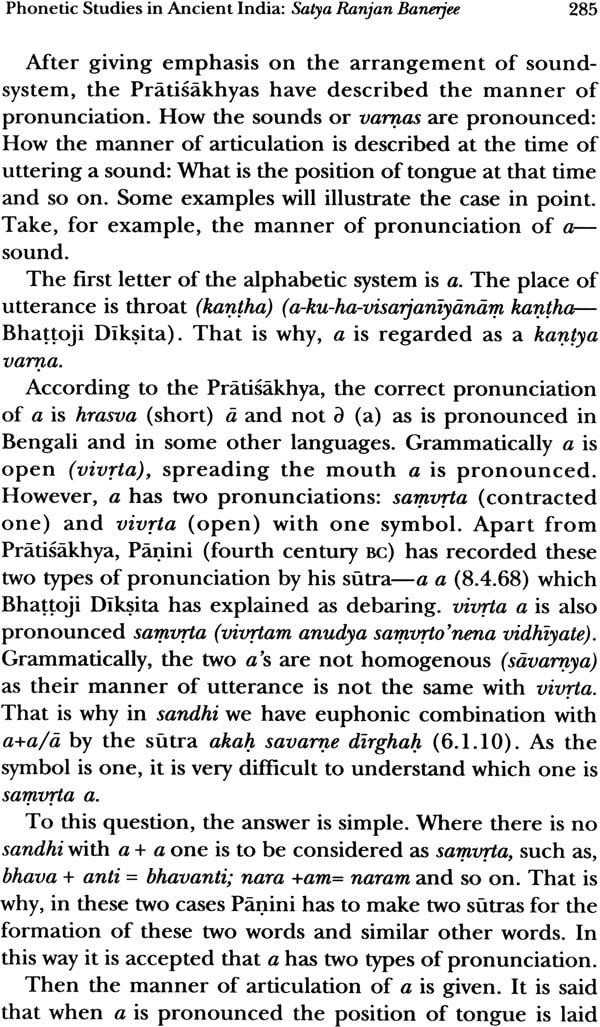
Vedalaksana Texts (Search and Analysis)
Book Specification
| Item Code: | NAN342 |
| Author: | Nabanarayan Bandyopadhyay |
| Publisher: | National Mission for Manuscripts |
| Language: | English |
| Edition: | 2017 |
| ISBN: | 9789380829401 |
| Pages: | 314 |
| Cover: | Hardcover |
| Other Details | 8.5 inch X 5.5 inch |
| Weight | 610 gm |
Book Description
The experience and knowledge from our past are recorded in manuscripts which have been handed down to us over several thousand years. The Government of India, through the Department of Culture, took note of till' vast tangible heritage and in order to locate, preserve and conserve as well as to make access to this wealth easy established the National Mission for Manuscripts. While looking ahead to reconnect with the knowledge of the past, the Mission is in the process of trying to re-contextualize the knowledge contained in manuscripts for the present and the future generations. National Mission for Manuscripts organizes seminars in collaboration with academic Institutions all over India on particular topics of Indian Knowledge system. The research-oriented papers as presented in the seminars by distinguished scholars are published under the Samikshika series.
The Seminar on "Vedalaks.uja Texts: Research and Analysis" was organized in Kolkata in collaboration with School of Vedic Studies, Rabindra Bharati University and Dr. Nabanarayan a Bandopadhyaya was the coordinator of this seminar.
The Seminar focused on Manuscripts related to Vedalaksana texts, mainly PratiSakhya and Siksa literature of the Vedas.
The National Mission for Manuscripts organizes national level seminars in different academic institutions all over India to promote research and interest in Indian knowledge systems with particular emphasis on manuscripts. The present Samikshika series brings forth the research papers on Vedalaksana texts as were presented by the scholars in the seminar "Vedalaksana Texts: Search and Analysis" organized at School of Vedic Studies, Rabindra Bharati University, Kolkata.
The Laksana-granthas of Vedas deal with phonetics, grammar, anukramanis, modes of recitation etc. These are of ancillary nature and come under Vedanga, Siksa is considered to be the most important among them.
Siksa is the science of phonetics under which syllabication of sound (varna), accent (varna), sound measurement (matra, place of articulation (prayatna), etc. are elaborately explained. In Vedic period, lot of importance was given to the correct pronunciation of the mantras at the time of their utterance.
Under Siksa Vedanga, come two types of compositions, viz. Pratisakhya and Siksa. Pratisakhyas are the first treatises under Siksa Vedanga dealing with the phonetic pecularities of all the sakhas of a praticular Veda. Siksa-texts, too, are related to particular recentions of the Vedas but these texts are posterior to the Pratisakhyas. These texts are mostly found in Karika-form leaving some which are written in the Sutra-form. All Veda-laksana texts render their help to understand the Vedas in true perspective.
There are a lot of manuscripts related to Vedalaksanas which have not been critically edited till date. Young scholars need to be encouraged to delve into those manuscripts in order to bring fourth the underlying implications of Vedic texts.
The Mission acknowledges the contribution of Prof. Nabanarayan Bandyopadhyay, Director, School of Vedic Studies, Rabindra Bharti University, Kolkata. The organisation of the seminar and publication of this volume wouldn't have been possible without his sincere cooperation. The Mission also thanks Dev Publishers & Distributors for bringing out this volume.
I do hope that the topics dealt with in this volume would help the readers to acquire knowledge of this genre of Vedic literature.
It is not generally realized that the texts on Veda-laksana (mainly extant in South Indian Vedic tradition) contain an abundance of valuable material of Vedic studies relating to Phonetics. The Laksana-granthas or texts which dilate upon the characteristics and the special features of Vedic texts are generally termed Veda-laksana. They are of ancillary nature and generally regarded as a component of the Vedanga. Veda-laksana texts can be classified into four categories: (a) works (mainly Siksa and Pratiakhya) on Vedic phonetics, phonology, grammar (also designated as 'Nomenclative Grammatical Works', according to Surya- kanta), etc., (b) works on Anukramanis, (c) works containing lists of words having peculiar characteristics in the Vedic texts, and d) works dealing mainly with modes of recitation, There are a large number of important texts, very few of which are available in print. An account of them can be trailed from various descriptive catalogues of manuscripts largely published from many institutes of South India and a voluminous work entitled Yedalaksana: Vedic Ancillary Literature: A Descriptive Bibliography by K. Parameswara Aithal, (Franz Verlag Stuttgart, 1991, an Indian reprint also published from MLBD, Delhi). It would be appropriate to focus our attention on these works concerning different aspects of Vedic learning. The practice of reciting the Vedas in the traditional manner is becoming fast extinct yet there has been in recent years a growing interest in the study of the oral and exegetic tradition of Vedic recitation amongst a select section of people.
The printed editions, with only a few exceptions, are either edited in a very uncritical manner, or contain a great deal of confusion regarding the authorship, titles, extent of the texts, etc. The unsatisfactory state of the printed editions on Laksanas is more evident from various publications which are full of errors due to mixing together of texts in the basic manuscript etc. or do contain the extraneous portions.
As we all know, there are two different aspects of the system of learning of the Vedas traditionally - the svadhyaya and the prayoga. Though a study of these aspects relate mainly to the recitation of the Vedas of one's own sakha, yet the study of the history of grammatical traditions in India as well as different branches of manuscriptology are bound to come with all their importance, thus adding an interdisciplinary essence to the matter as far as possible.
As a growing interest has been found in recent years in the study of the oral tradition of Vedic recitation it seems appropriate to undertake the study and research on these types of texts. The purpose and significance of preparing text-critical edition of the hitherto unpublished Laksana texts along with their critical analysis and translation is to attract due attention to this particular branch of Vedic studies which unfortunately appears to have dwindled to the point of extinction despite efforts made by great scholars interested in this particular field more than a century ago. The significance lies mainly in the history of the study of Indian grammatical and linguistic traditions which begins with the Siksa and the Pratisakhya. Though they contain instructions on pronunciation, intonation, euphonic changes of sounds in word combinations, elongation of vowels etc, the holistic manner of recitation of the Samhitas is not itself actual works of grammar still they deal with subjects which belong to grammar and linguistics.
They bear the testimony of the "fact that the texts of the Samhitas have been preserved without any change throughout all these centuries since the time of the Pratisakhya, the Rgveda Pratisakhya being the oldest text book of Vedic phonetics. And the fact that the practice of different modes of recitation or the method of instruction is emphatically necessary for the proper understanding and transmission of any kind of Vedic text, hence the effort to undertake the proposed study. In order to retrieve this hallowed heritage and bringing to light this invaluable treasure of source material as of the Veda-laksana texts, serious integrated efforts have to be put in to avoid the inevitable extinction of the quintessence of ancient Indian learning and thought.
The methodological and didactic aspect of Vedic text tradition is yet to be thoroughly and systematically investigated in modern Vedic scholarship and research. A recent study reveals that there are about 200 Siksa treatises which have not so far received that amount of serious attention of the scholars which they deserve. Very few of them have come out only in the form of popular editions, not in critically edited shape. Although the importance of the padapatha i.e. word-for-word-recitation, has been recognized, we know that it has neither been systematically studied or researched upon, nor there is a proper edition as it is recited by traditional pundits. To elicit the views of scholars in this field, a 3-day National Seminar on 'Veda- laksana Texts: Search and Analysis' was organized by the School of Vedic Studies, Rabindra Bharati University, under the auspices of the National Mission for Manuscripts, New Delhi, which was dedicated to the sacred memory of Swami Vivekananda on his sesquicentennial birth anniversary.
The inaugural session had very distinguished and special personalities as Prof. Karunasindhu Das, former Vice- Chancellor, Rabindra Bharati University as the inaugurator who being a grammarian and philosopher himself, explained the Veda-laksana texts with all their technicalities. It was always been a rare experience listening to Prof. T.N. Dharmadhikari, former Director, Vaidika Samshodhana Mandala, who while delivering the keynote address deliberated on most difficult and technically complicated issues on Vedic studies and especially this time he illuminated the audience with demonstration of certain varieties of accents and pronunciation of Vedic svara-s of typical type. The session was blessed by the presence of Swami Sarvapriyananda, Acharya, Probationers' Traning College at Belur Math who while delivering his address as the Special Guest brought forth Swami Vivekananda's thoughts on the Vedas and Upanishads and thus initiated the discussion of his multifaceted personality. Prof. Ratna Basu, Dept. of Sanskrit, Calcutta University and Cordinator, Calcutta University Manuscript Resource Centre and Manuscript Conservation Centre, addressed the audience as the Guest of Honour about its aim and activities thereby bringing in the context of text-editing, the highly technical academic exercise involving manuscripts. The brief presidential address by Prof. Chinmoy Guha, Vice-Chancellor of the University, was full of words of encouragement and wishes for its success. He congratulated the School for the concern they keep for the cause of caring and preservation of the ancient Indian wisdom in their every academic effort.
It was very satisfying and encouraging at the same time to note that a large number of research papers were presented during the academic sessions of the seminar besides the key note and the valedictory address. The distinguished outstation scholars included, to name a few, Prof. B.B. Chaubey, former Director, VVBIS & IS, Professor Emeritus, Panjab University, Paper on 'Importance of Editing Vedic Laksana-texts with special reference to Stobhanusamhara': Prof. Sitanath Dey, former Professor, Tripura University, 'The Importance of Studying Pratisakhyas with special reference to the Vajasaneyi Pratisakhya'; Prof. S. Sudarshan Sharma, Vice-Chancellor, Sri Venkateswar Vedic University, Tirupati; Prof. Dipak Bhattacharya, former Professor, Dept. of Sanskrit, Pali and Prakrit, Visva-Bharati University, 'Laksana granthas in Solving Exegetical Problems of the Atharvaveda'; Dr. C.M. Neelakandhan, Dept. of Sanskrit Sahitya, Sree Sankaracharya University, Kaladi, 'Veda-laksana Texts and Tradition of Kerala'; Dr. P. Ramanujan, Associate Director, IHG, CDAC, Bangalore, 'A Computer-based Manuscript (Palm-leaf) Editor'; Prof. Manjula Devi, Dept. of Sanskrit, Gauhati University, 'Some Observations on the Context of Vedadhyayana i.e., the Study of the Veda in the Pratisakhyas'; Dr. Nirmala R. Kulkarni, Research Scientist, CASS, Pune University, 'Sabdabrahmavilasa: An Unpublished Commentary on the Taittiriya Pratisakhya': Prof. Bhagyalata Pataskar, Director, Vaidika Samshodhana Mandala, Pune, 'Manduki Siksa, the only Siksa belonging to the Atharvavedic Tradition'; Dr. Shri Krishanh Sharma, Professor and Ex-Director, Institute of Sanskrit and Indological Studies, Kurukshetra University, 'Parisiksayah Vislesanatmakah Paricayah; Prof. Radhamadhab Dash, Head, P.G. Dept. of Sanskrit, Utkal University, Bhubaneswar 'Rk- Pratisakhya and Panini or Samhita', etc.
Among the local scholars who participated as resource persons were, to mention a few, Prof. Satya Ranjan Banerjee, former Professor of Linguistics, Calcutta University 'Phonetic Studies in Ancient India'; Prof. Bhabani Prasad Bhattacharya, former Professor of Sanskrit Jadavpur University, 'Nature of Vivrtti as revealed in Siksas and Pratisakhyas'; Prof. Ratna Basu, Dept. of Sanskrit, Calcutta University, 'Paniniyasiksa and Science of Logopaedie'; Prof. Didhiti Biswas, Dept. of Sanskrit, Calcutta University, 'Some Observations on Naradiyasiksa'; Dr. Chhaya Bhattacharya, 'Technical Terms found in the Pratisakhyas, with special reference to Sound Vibrations'; Prof. Pradyot Kumar Datta, Dept. of Sanskrit, Jadavpur University, 'Emergence of Vedalaksana Ponetic Text of Samapralisakhya': Dr. Mau Dasgupta, Dept. of Sanskrit, Calcutta University, 'In Search of the lost Mandukeya Tradition: A Phonetic Reference at the Rkpratisakhya'; Dr. Indrani Kar, Associate Professor, Dept. of Sanskrit, Scottish Church College, Kolkata, 'Accent in the Rkpratisakhyas: A Study'; Dr. Subhra Ghosh, 'Treatment of the Two Alphabetic Sounds ‘r' and ‘I’ in Sanskrit Phonology'; Prof. Taraknath Adhikari, Dept. of Sanskrit, Rabindra Bharati University, 'Laksanagranthas of the Atharvaveda and their Importance'; Dr. Parboty Chakraborty, Associate Professor, Dept. of Sanskrit, Rabindra Bharati University, 'The Nature of Anunasika: Phonetic and Grammatical Speculations'; Dr. Ashok Kumar Mahata, Assistant Professor, Rishi Bankim College, Naihati, 'The Concept of matra in the Vajasaneyi Pratisakhya with special reference to the quantity of avagraha'; Dr. Bhaskarnath Bhattacharya, Associate Professor of the School, Rabindra Bharati University, 'Vedalaksana -how does it establish the magnanimity of the Samaveda'; Dr. Soma Basu, Associate Professor of the School, 'Euphonic Combination in the Rkpratisakhya: A Brief Study', etc.
The valedictory session was chaired by Prof. B. B. Chaubey, former Director, VVBIS & IS, Professor Emeritus, Panjab University and the valedictory address was delivered by Prof. Samiran Chandra Chakrabarti, former director of the School and former Emeritus Fellow, UGC, who explained in detail the technicalities of the Laksana texts of the different Vedas. It is gratifying to note that we are going to publish maximum number of papers presented at the mentioned seminar in this volume. Very few of them could not be collected from the learned resource persons despite our best efforts. One research scholar, however, Shri Subhendu Manna by name, submitted his paper on 'Upasarga in Sanskrit Language' for publication and myself added a paper on 'Sandhikarika: All Unpublished Laksana Text' relating to the topic of the seminar. I express my sincere thankfulness and gratitude to the distinguished scholars who contributed papers and participated in the deliberations of the seminar. I am grateful to the authorities of National Mission for Manuscripts, New Delhi, for kindly sponsoring the Seminar and undertaking this work of publication. A lot of thanks and appreciation are due to Dr Sanghamitra Basu, Coordinator of Research and Publication of National Mission for Manuscripts for actively assisting me in the process of editing and printing of this volume. Without her encouraging efforts it would not possibly see the light of the day. I shall be failing in my duty if I do not express my heartfelt thanks to the members of the School, specially to Professor Samiran Chandra Chakrabarti, Dr Bhaskarnath Bhattacharyya, Dr Soma Basu and the then Project Assitants who had extended their helping hands in respect of successful organization of the seminar and the related matters of publication. Messrs Dev Publishers & Distributors have also very satisfactorily done the job of printing of this volume. At the end, I also crave for indulgence of the readers for any error inadvertently crept in. Every suggestion for future improvement of this volume will be greatly appreciated. Hope, the present volume will regenerate interest in doing study and research on ancillary Vedic texts among promising scholars.
Contents
| Foreword | ix | |
| Introduction | xi | |
| Key to Transliteration | xix | |
| Vedalaksana Texts (Keynote Address) | 1 | |
| Importance of Editing Vedic Laksana--Texts with Special Reference to Stobhanusambhara | 23 | |
| Laksanagranthas in Solving Exegetical Problems of the Atharvaveda | 35 | |
| Emergence of Vedalaksana Phonetic Text of Samapratisakhya | 49 | |
| Vedalaksana Texts and Tradition of Kerala | 65 | |
| Rk-Pratisakhya and Panini on "Samhita" | 79 | |
| Manduki Siksa--Bhagyalata Pataskar | 99 | |
| Sabdabrahmavilasa: An Unpublished Commentary on the Taittiriya Pratisakhya | 113 | |
| The Importance of Studying Pratisakhya with Special Reference to the Vajasaneyi Pratisakhya | 121 | |
| A Computer-based Manuscript | 125 | |
| In Search of the Lost Mandukeya Tradition: A Phonetic Reference at the Rk Pratisakhya | 131 | |
| Upasarga in Sanskrit Language | 139 | |
| Treatment of Matra in the Vajasaneyi Pratisakhya with Particular Reference to Quantity of Avagraha | 161 | |
| Treatment of the Two Alphabetic Sounds 'I' and 'I' in Sanskrit Phonology | 165 | |
| Some Observations on the Context of Vedadhyana, i.e., the Study of the Vedas in the Pratisakhyas | 169 | |
| Nature of Vivrtti as Revealed in Siksas and Pratisakhyas | 179 | |
| A Revisit to The Sphota Theory in Response to Queries on Speech Production and Speech Reception | 187 | |
| An Introduction to the Naradiyasiksa | 209 | |
| Laksanagranthas of the Atharvaveda and their Importance | 219 | |
| Nature of Anunasika: Phonetic and Grammatical Speculations | 231 | |
| परिशिक्षया विश्लेषणात्मक: परिचय | 243 | |
| Accent in the Rk-Pratisakhya: A Study | 253 | |
| Vedalaksana--How does it Establish the Magnanimity of the samaveda | 263 | |
| Euphonic Combination in the Rk-Pratisakhya: A Brief Study | 269 | |
| Phonetic Studies in Ancient India | 277 | |
| Sandhikarika: An Unpublished Laksana Text | 301 |
